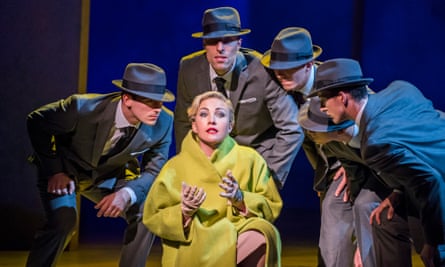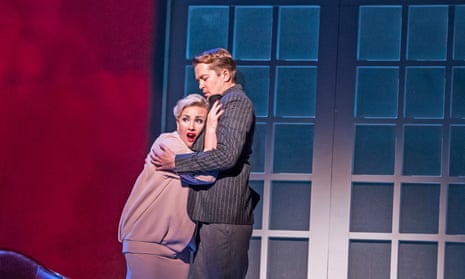Given its world premiere by English National Opera, Nico Muhly’s Marnie is drawn from Winston Graham’s 1961 novel of the same name, famously filmed by Alfred Hitchcock in 1964. The subject, Muhly argues, “screams out for operatic treatment”, and his heroine – a thief and liar acting out of compulsive responses to half-remembered childhood trauma – certainly has antecedents elsewhere. Muhly links her fear of sex and physical contact to Debussy’s Mélisande, who, like Marnie, is also trapped in a marriage with a potentially abusive man. There are also overtones of Emilia Marty in Janácek’s Makropoulos Case, who similarly changes her identity multiple times for the purposes of deception.
Muhly and his librettist Nicholas Wright follow the outlines of the novel rather than the film. Whereas Hitchcock relocated the drama to the US, they retain the original British setting – the grubbily monetarist home counties in the 1950s. We encounter characters that Hitchcock dropped, most crucially, perhaps, Mrs Rutland, the formidably manipulative mother of Marnie’s husband, Mark. Terry, Mark’s cousin in the book, has become his attractively dissolute brother. The operatic Marnie has no phobia of the colour red, and, as in Graham but not in Hitchcock, her mother dies before the truth about the past comes to light.
Music and dramaturgy are stylised, at times a bit too much so. In a gesture towards Jungian psychology, Marnie is tracked by four similarly dressed “shadows”, who sing in Monteverdian close harmony, while eight male dancers in suits and trilbies hover round her, omnipresent reminders of the masculinity she understandably dreads. The chorus are both essential to the drama and commentators upon it. The climactic hunt, in which the death of Marnie’s horse Forio results in her first experience of grief, is closer to oratorio than opera – a big choral narrative, followed by a succession of arias.

The score has passages of undeniable beauty. Muhly twins each protagonist with an orchestral instrument. An oboe, by turns elegant and shrill, probes Marnie’s psyche. Growling trombones suggest Mark’s desire, while a trumpet, sleazy yet poised, conveys Terry’s louche charm. A lyrical warmth characterises Muhly’s vocal lines, and the choral writing, geared to the ENO chorus for whom Muhly has expressed great admiration, is tremendous, arguably constituting the finest music in the entire work. Yet there is a major flaw, which is primarily one of tone. Muhly’s approach is essentially reflective and there’s too little menace and tension throughout. The crucial figure of Marnie’s abusive mother strikes me as under-characterised. This psychological thriller doesn’t always thrill as it should.
It is, however, superbly done. Sasha Cooke and Daniel Okulitch, fine artists both, admirably convey the central couple’s difficult relationship. Neither character is immediately sympathetic, though both performers keep us the right side of empathy. Cooke sounds gorgeous and is a compelling actor. Okulitch has a nice line in vulnerability that makes Mark’s predatory sexuality all the more troubling. Countertenor James Laing is the ambiguously motivated Terry, to whom Muhly allots arguably the most memorable aria in the score. There are strong cameos from Lesley Garrett as Mrs Rutland, and Diana Montague as Lucy, the friend of Marnie’s mother who holds the key to the past. Michael Mayer’s staging has an elegant fluidity that whisks us from offices to mansions and from tenements to a psychoanalyst’s consulting rooms. Martyn Brabbins conducts with great sensitivity. The playing and choral singing are outstanding.

Comments (…)
Sign in or create your Guardian account to join the discussion